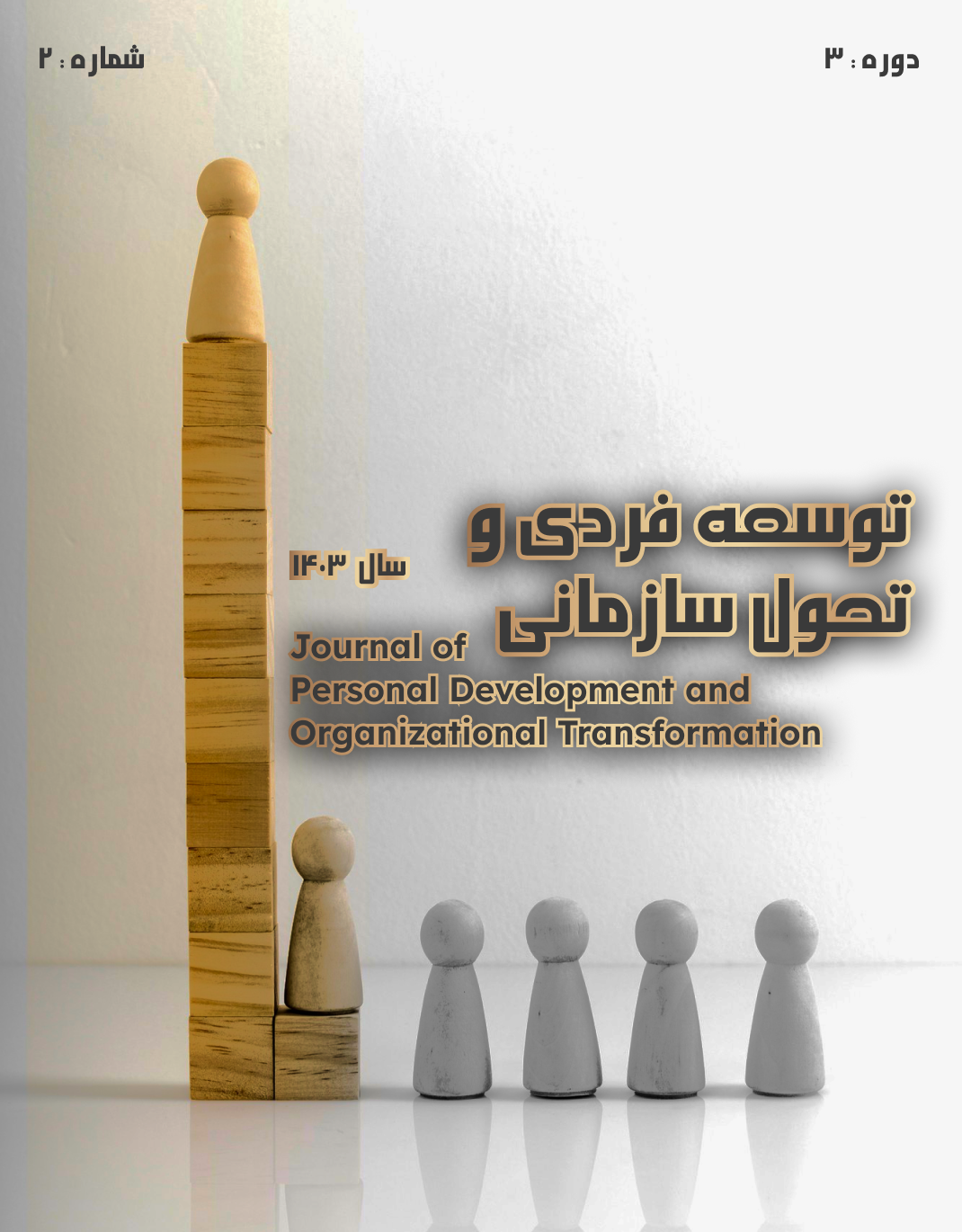تأثیر توانمندسازی روانشناختی بر عملکرد شغلی معلمان با نقش میانجی هویت حرفه ای و بهزیستی روانشناختی
کلمات کلیدی:
توانمندسازی روانشناختی, عملکرد شغلی, هویت حرفهای, بهزیستی روانشناختی, معلمان ابتداییچکیده
هدف پژوهش حاضر بررسی تأثیر توانمندسازی روانشناختی بر عملکرد شغلی معلمان با نقش میانجی هویت حرفهای و بهزیستی روانشناختی است. مطالعه حاضر از نوع توصیفی-پیمایشی و کاربردی بوده و جامعه آماری آن را معلمان مدارس ابتدایی شهرستان رودسر تشکیل میدهند. حجم نمونه با استفاده از جدول کرجسی و مورگان 384 نفر تعیین شد و نمونهگیری به روش تصادفی ساده انجام گرفت. برای گردآوری دادهها از چهار پرسشنامه استاندارد شامل عملکرد شغلی، توانمندسازی روانشناختی، بهزیستی روانشناختی و هویت حرفهای استفاده شد. روایی و پایایی ابزارها با استفاده از بارهای عاملی، آلفای کرونباخ، پایایی ترکیبی و AVE بررسی شد. تحلیل دادهها با نرمافزار Smart PLS و در قالب مدلسازی معادلات ساختاری انجام گرفت. نتایج نشان داد که توانمندسازی روانشناختی تأثیر مستقیم و معناداری بر عملکرد شغلی دارد. همچنین این متغیر از طریق دو مسیر غیرمستقیم، یعنی بهزیستی روانشناختی و هویت حرفهای نیز بر عملکرد تأثیرگذار است. ضرایب مسیرها و آمارههای t حاکی از معناداری روابط بین توانمندسازی و متغیرهای میانجی، و همچنین روابط بین متغیرهای میانجی و عملکرد شغلی بود. شاخص GOF نیز برازش کلی مطلوب مدل را تأیید کرد. توانمندسازی روانشناختی معلمان میتواند بهصورت مستقیم و غیرمستقیم عملکرد شغلی آنان را ارتقا دهد. بنابراین، سیاستگذاران آموزشی و مدیران مدارس میبایست با تقویت ابعاد روانی، معنوی و حرفهای معلمان، زمینه بهبود کیفیت عملکرد آموزشی را فراهم سازند.
دانلودها
مراجع
Abdul, B., Jing, Z., Wang, L., & Rabeeu, A. (2024). Assessing the Impact of Employee-Centric Digital Transformation Initiatives on Job Performance: The Mediating Role of Digital Empowerment. Strategic Management, 29(2), 5-18. https://doi.org/10.5937/straman2300057r
Asadi, P., Farhadi, H., & Golparvar, M. (2021). Effectiveness of Psychological Empowerment Package on the Psychological Wellbeing and Rumination of the Parents of the Children with Cancer. Empowering Exceptional Children, 12(1), 84-94. https://doi.org/10.22034/ceciranj.2021.246311.1443
Ding, J., & Xie, Z. (2021). Psychological Empowerment and Work Burnout Among Rural Teachers: Professional Identity as a Mediator. Social Behavior and Personality an International Journal, 49(6), 1-9. https://doi.org/10.2224/sbp.10241
En, W. C. (2023). Research on the Relationship Between Principal’s Transformational Leadership, Teachers’ Empowerment, and Teachers’ Well-Being. Ijer, 1(1). https://doi.org/10.33552/ijer.2023.01.000503
Fan, X., Zhao, S., Zhang, X., & Meng, L. (2023). The Impact of Improving Employee Psychological Empowerment and Job Performance Based on Deep Learning and Artificial Intelligence. Journal of Organizational and End User Computing. https://doi.org/10.4018/joeuc.321639
Hassard, J., Wong, I. L. K., & Wang, W. (2022). Workplace Empowerment, Psychological Empowerment and Work-Related Wellbeing in Southeast Asian Employees: A Cross-Sectional Survey. Health Promotion International, 37(4). https://doi.org/10.1093/heapro/daac113
Jafarzadeh, O., Elhaghlipour, M., Mehrandish, H., & Mirtajoddini, S. N. (2024). Investigating Fundamental Strategies for Improving Teacher Empowerment and Their Better Performance in Schools. Specialized Scientific Quarterly of New Research in Psychology, 5(2), 82-88. https://www.magiran.com/paper/2797521/
Lardier, D. T., Garcia-Reid, P., & Reid, R. J. (2019). The Examination of Cognitive Empowerment Dimensions on Intrapersonal Psychological Empowerment, Psychological Sense of Community, and Ethnic Identity Among Urban Youth of Color. The Urban Review, 51(5), 768-788. https://doi.org/10.1007/s11256-019-00504-7
Maarefvand, A., & Shafiabady, A. (2024). Effectiveness of Shafie-Abadi's Multidimensional Model Training on Enhancing Occupational Well-being and Quality of Work Life among Teachers in Qom City. International Journal of Education and Cognitive Sciences, 4(4), 21-30. https://doi.org/10.61838/kman.ijecs.4.4.3
Maden-Eyiusta, C., & Alten, O. (2023). Expansion-oriented job crafting and employee performance: A self-empowerment perspective. European Management Journal, 41(1), 79-89. https://doi.org/10.1016/j.emj.2021.10.012
Moayedimehr, M., Peymani, J., Ahadi, H., & Tizdast, T. (2023). Investigating the Impact of Psychological Empowerment Program Training on Marital Responsibility and Mental Well-being in Spouse of Addicted Husband. IJPN VL - 11 IS - 3 SP - 81 EP - 94. https://ijpn.ir/browse.php?a_id=2124&sid=1&slc_lang=en
Mojouni, H., & Rahimi, H. (2024). Investigating the relationship between digital leadership and creative performance mediated by psychological empowerment in teachers. Journal of Research in Educational Science, 18(64), 35-54. https://www.jiera.ir/article_198099.html?lang=en
Molix, L., & Bettencourt, B. A. (2010). Predicting Well-Being Among Ethnic Minorities: Psychological Empowerment and Group Identity. Journal of Applied Social Psychology, 40(3), 513-533. https://onlinelibrary.wiley.com/doi/abs/10.1111/j.1559-1816.2010.00585.x
Momand, Z., & Gul, S. (2023). The Impact of Knowledge Management on Organizational Performance With the Mediating Role of Psychological Empowerment. Kardan Journal of Economics and Manangement Sciences. https://doi.org/10.31841/kjems.2023.136
Niinihuhta, M., & Häggman-Laitila, A. (2022). A systematic review of the relationships between nurse leaders' leadership styles and nurses' work-related well-being. İnternational journal of nursing practice, 28(5), e13040. https://doi.org/10.1111/ijn.13040
Peng, S., Li, H., Xu, L., Chen, J., & Cai, S. (2023). Burden or Empowerment? A Double-Edged Sword Model of the Efficacy of Parental Involvement in the Academic Performance of Chinese Adolescents. Current Psychology, 43(4), 3786-3797. https://doi.org/10.1007/s12144-023-04589-y
Rahmawati, S. (2023). POS and Psychological Empowerment as Moderating Variables on the Effect of Job Insecurity on Employee Performance in Islamic Banks. Jurnal Manajemen Teknologi, 22(2), 124-134. https://doi.org/10.12695/jmt.2023.22.2.1
Shi, P., & Wang, J. (2023). The Impact of Customer Empowerment Behaviour on Service Workers' Craftsman Spirit: The Role of Professional Identity Enthusiasm and Perceived Organizational Support. https://doi.org/10.4108/eai.24-2-2023.2330681
Valeh, M., Shokri, O., & Asadzadeh, H. (2021). Effectiveness of mental empowerment training program on increasing teachers’ psychological capital and job-related affective well-being. Journal-of-Psychological-Science, 20(100), 579-596. http://psychologicalscience.ir/article-1-843-en.html
Zeer, I. A., Ajouz, M., & Salahat, M. A. (2023). Conceptual Model of Predicting Employee Performance Through the Mediating Role of Employee Engagement and Empowerment. International Journal of Educational Management. https://doi.org/10.1108/ijem-03-2023-0095
دانلود
چاپ شده
ارسال
بازنگری
پذیرش
شماره
نوع مقاله
مجوز
حق نشر 2025 Masoumeh Taghavi Deylamipour, Samira Pali (Author)

این پروژه تحت مجوز بین المللی Creative Commons Attribution-NonCommercial 4.0 می باشد.







